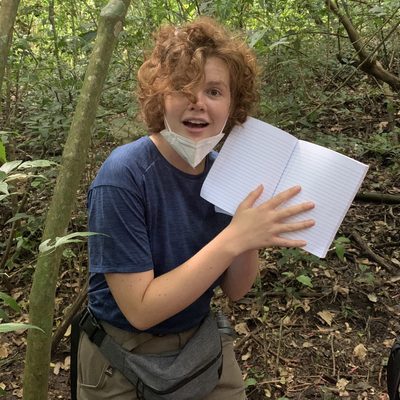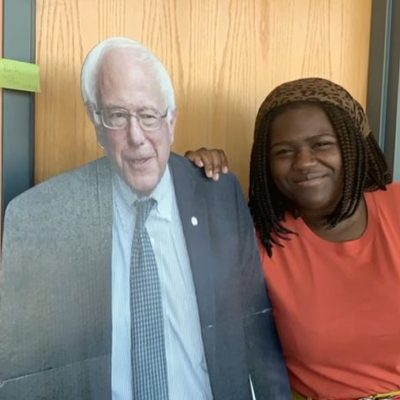The Sustainability Office oversees the work of the Climate Action Plan and reducing our emissions through operations, education, and outreach. We are in the process of updating our plan to identify our next goals and activities that will accelerate carbon neutrality and deepen sustainability education and community collaboration.
If you have questions that are primarily related to outreach, education, or community engagement please contact the director. If you have questions related to energy management and emissions, please contact the energy manager. If you need support coordinating or collaborating on an event please contact our coordinator.
Director of Sustainability
Energy Manager
Sustainability Coordinator & 5th Year Education Associate
Student Office Manager

Hi! My name is Eli Watt (they/she) and I am a junior Environmental Studies major. As a member of the Food and Outreach Teams, I’m working to increase the variety of plant-based options in the dining hall, as well as advocate for ethical purchasing choices that center sustainability and farmworkers’ rights. In addition, I run the sustainability office’s website, Instagram page, and STA blog — go check them out!
Sustainability Leaders

Hello! My name is Grace Bassekle (she/they) and I am a junior SOAN major. I am the sole member of the Environmental Justice team and my objective is to use storytelling to illustrate what sustainability means through an environmental justice lens. During my first year as a STA, I organized a round table series, worked on sharing individual sustainability stories, hosted an alum speaker, and wrote project proposals. I am so pleased to be a STA and excited for our future endeavors!

Hi! My name is Eli Watt (they/she) and I am a junior Environmental Studies major. As a member of the Food and Outreach Teams, I’m working to increase the variety of plant-based options in the dining hall, as well as advocate for ethical purchasing choices that center sustainability and farmworkers’ rights. In addition, I run the sustainability office’s website, Instagram page, and STA blog — go check them out!
Committees & Partners
Environmental Advisory Committee
The Environmental Advisory Committee (EAC) is the governing body of environmental action at Carleton. This committee has been paused as the Sustainability Working Group updates our Climate Action Plan, including identifying new committee structures for our next work.
Learn more about the past work of the Environmental Advisory Committee.
Center for Community & Civic Engagement Environmental Systems Cohort
The Center for Community & Civic Engagement (CCCE )encourages students to pursue their passions by participating in co-curricular programs, academic civic engagement courses, and paid student work positions. Some programs specific to sustainability include:
Environmental Carls Organized (ECO)
ECO is a student organization dedicated to promoting environmental awareness and activism at Carleton and in the greater Northfield community. Every week we meet Wednesday night at 8pm in Sayles 253 for discussion and action while working towards our goal of helping to increase environmental stewardship and sustainability in the world around us.
Divest Carleton
Divest Carleton aims to change the way the public, governments, and investors view fossil fuel companies in order to create a political atmosphere where large-scale climate action is possible. In an effort to achieve this, Divest Carleton calls upon Carleton College to remove its direct holdings in the top 200 fossil fuel companies. In 2023 this milestone was achieved when the Trustees voted to exit fossil fuel holdings.
Carleton Association of Nature and Outdoor Enthusiasts (CANOE)
The Carleton Association of Nature and Outdoor Enthusiasts (CANOE) is a group of students who love the outdoors and want to share that experience with other students. We are one of the largest student organizations on campus, with hundreds of students going on trips every year.
Policies
Utility Master Plan
The Utility Master Plan advanced our 2011 Climate Action Plan which is the guiding document supporting our goal of making Carleton’s campus carbon free by the year 2050. Our new utility system will utilize four forms of renewable energy – wind, solar photovoltaic, solar thermal, and geothermal – and is flexible enough to take advantage of future advancements in renewable energy technologies. Carleton has a cutting edge geothermal system and two wind turbines.
For more information about the Utility Master Plan, explore this website.
Climate Action plan
Carleton’s Climate Action Plan (CAP) was approved by the Board of Trustees in 2011. The CAP set a goal of becoming a carbon-free campus by the year 2050. The Sustainability Working Group is now working on accelerating that timeline and developing new actions.
Circulation Plan
A committee of faculty, staff, and students worked hard over the 2019-2020 academic year to develop a draft plan for campus circulation (traffic flow for bikes, cars, and pedestrians, parking and deliveries, and accessibility). View the entire plan.
Inclusivity, Diversity, and Equity Statement
The Sustainability Office actively works to address the inequities and injustices associated with climate change and environmental harms. Our work supports real-time behavior shifts that contribute to emissions reduction. We also work to shift resources and improve policies, practices, and culture for equity and justice.









